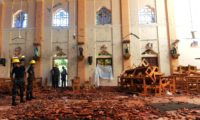Sri Lanka lifted its nationwide ban on social media Tuesday after putting it in place following the Easter bombings to prevent the spread of false news reports.
The end of the ban signals the conclusion of the government’s investigation into the bombings, which claimed the lives of more than 200 people and injured over 400 more on Easter Sunday. The banned apps included Facebook, Instagram, Snapchat, WhatsApp, and YouTube, according to CNN.
Social media platforms have famously struggled to stem the sharing of violent content in the wake of terrorist attacks. Facebook released a statement following the Christchurch mosque shooting in New Zealand saying it removed 1.5 million versions of the video within 24 hours of the attack, but the footage proliferated regardless.

Security personnel inspect the interior of St. Sebastian’s Church in Negombo after it was hit in series of bomb blasts targeting churches and luxury hotels in Sri Lanka. (ISHARA S. KODIKARA/AFP/Getty Images)
The Sri Lankan government’s outright ban on signing in to these platforms is a solution that isn’t available to most Western governments thanks to strong sentiments against censorship. The social media ban wasn’t the only radical measure the nation undertook, however. The government also imposed an emergency ban on face coverings, including burqas and anything that “hinders identification.” (RELATED: ‘A River Of Blood’: Coordinated Church Bombings Kill More Than 200 In Sri Lanka)
The country’s Muslim population said the ban was unnecessary because they had resolved not to wear face coverings voluntarily in the wake of the attacks.
“It is the stupidest thing to do,” Hilmy Ahmed, vice-president of the Sri Lanka Muslim Council said in a statement. “Three days ago we [the Muslim community] took a voluntary decision regarding this. The All Ceylon Jamiyyathul Ulema told all Muslim women not to wear face veils for security reasons. If they wanted to wear a veil, then they were told not to come out.”
“We see this as a reflection of the conflict between the president and the prime minister. We strongly criticize the decision. We will not accept the authorities interfering with the religion without consulting the religious leadership.”
Send Tips: anders@dailycallernewsfoundation.org
All content created by the Daily Caller News Foundation, an independent and nonpartisan newswire service, is available without charge to any legitimate news publisher that can provide a large audience. All republished articles must include our logo, our reporter’s byline and their DCNF affiliation. For any questions about our guidelines or partnering with us, please contact licensing@dailycallernewsfoundation.org.


